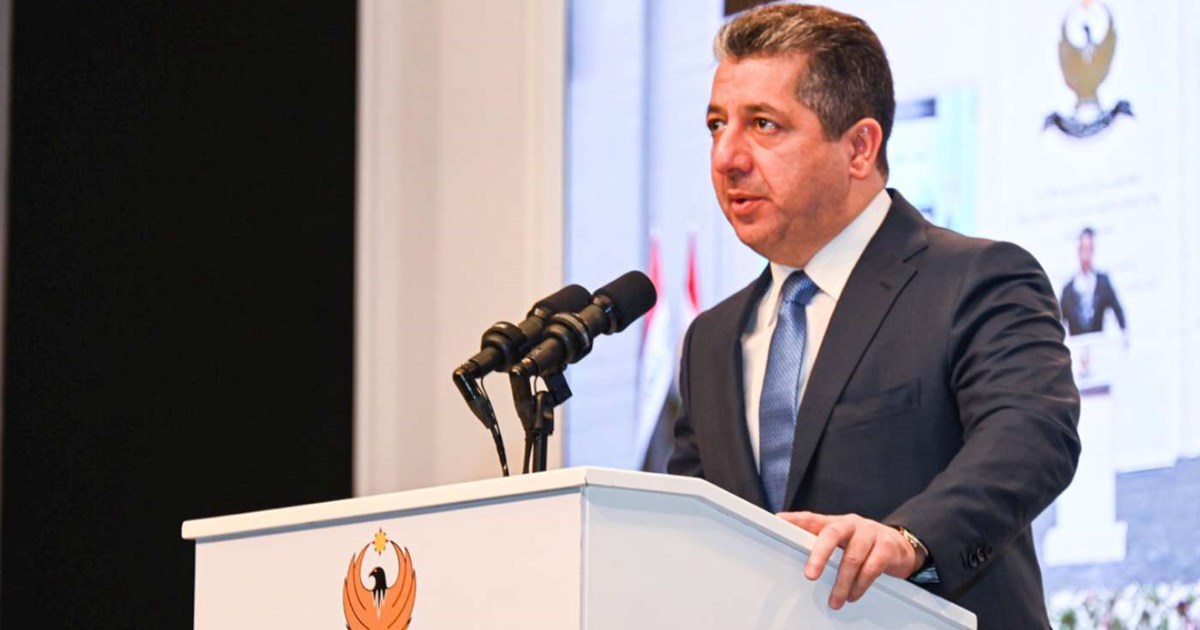PM Masrour Barzani’s Speech at Human Rights Action Plan Annual Conference

Erbil, Kurdistan Region (GOV.KRD) - Prime Minister Masrour Barzani today attended a ceremony commemorating the one-year anniversary of the approval of the Kurdistan Region's Human Rights Plan.
During the ceremony, Prime Minister Barzani delivered a keynote speech in which he reaffirmed that the Plan is central to the Ninth Cabinet’s reform agenda.
The following is the full transcript of the Prime Minister’s speech:
In the name of God,
Dear brothers, sisters, and distinguished guests,
I am honored to be here with you today at this ceremony celebrating the one-year anniversary of the approval and implementation of the Kurdistan Region's Human Rights Plan.
This plan is a general roadmap, approved by the Kurdistan Regional Government to ensure the development of the preservation of human rights in the Kurdistan Region in all fields over the next five years.
Protecting and developing human rights is one of the top priorities of the government. The plan aims to preserve and support peaceful coexistence between the different communities within the region, strengthen the principles of freedom and democracy, eliminate violence, radicalism, extremism and gender inequality, and safeguard human rights.
On this occasion, we reiterate the government’s commitment to develop a culture of religious and ethnic coexistence, which preserves personal and public freedoms and democratic principles.
Esteemed attendees,
We have a multidimensional reform agenda and with the support of God, the people of Kurdistan and our friends in the international community, we seek to overcome all obstacles and progress towards a more developed form of governance that serves the people and protects their rights as the core guiding principle and priority of government.
The Kurdistan Region’s Human Rights Plan is part of the Ninth Cabinet’s reform process. This plan has been conceived in great detail. Advice has been sought from the judiciary, the Kurdistan Region's Presidency, the Parliament Presidency and the representative of United Nations Assistance Mission to Iraq (UNAMI), as well as representatives of civil society, non-governmental organizations and diplomatic missions, and the Plan is now in the process of implementation. I hope that the contents of the Human Rights Plan are implemented in the different institutions of the government in a meaningful way which influences the development of a good governance, the rule of law, and a culture of preserving human rights in the Kurdistan Region.
It is hugely heartening to see that most sections of that Plan have, over the past year, already been implemented in the Kurdistan Region as laws, directives, and actions. We can even say that in comparison to many other countries, the Kurdistan Region is performing well, particularly with respect to preserving the rights of the communities law, the law of confronting domestic violence, the law of preserving the rights of children, the journalism law, and many others.
To this end, the Kurdistan Region operates within the framework of international conventions on human rights, and the Constitution and laws of both Iraq and the Kurdistan Region in order to preserve and respect human rights.
Simultaneously, the government has taken many steps to ease the suffering of families who have lost their loved ones at the hands of the so-called Islamic State (ISIS). It has also played an important role in rescuing Yazidis and others who have been kidnapped by these terrorists, and in ensuring the recognition of the crimes of ISIS as genocide and war crimes. As such, the government, with the support of the international community and UNITAD, submitted a bill to Parliament in order to establish a specific court to put ISIS terrorists on trial for their international crimes. Unfortunately the so-called Federal Supreme Court of Iraq rejected the bill, which set a new and dangerous precedent, preventing ISIS terrorists from being brought to justice.
The Kurdistan Region’s Human Rights Plan sets out a mechanism to align the laws of the region with international treaties and conventions.
As for people with special needs, a nurturing and supportive environment has been created to preserve their rights and develop their considerable skills.
The Kurdistan Regional Government is a successful example of developing democracy and promoting democratic values, including the right to the freedom of expression. It also abides by a strong institutional system, with power divided between the executive, legislative and judicial branches of the state. A strong and active international community also resides in the Kurdistan Region, acting as monitors alongside the numerous international organizations, agencies, and institutions that partake in monitoring and aid the development of human rights principles in prisons and detention centers.
We are in full compliance with the rule of law and both supports and preserves an independent judiciary. Moreover, the protection and development of freedom of expression and freedom of the press are among the highest priorities of the government. For this purpose, the Kurdistan Regional Government works with international partners to ensure that the Kurdistan Region complies entirely with international human rights standards, including the freedom of press.
We have tasked the government’s Coordinator for International Advocacy to oversee the implementation of the Plan in cooperation with Ministries and institutions. They will also keep us apprised of the development of the plan, its implementation, and any obstacles encountered, as one of the key goals of the plan is to highlight shortcomings and propose solutions to address them.
I would like to thank the institutions of the government for taking over this duty, and I express my deepest respect and appreciation to the legislative and judicial branches as well as independent parties that have undertaken the implemention of the plan. We also highly value the advisory role of local and international agencies and organizations who have contributed to this process.




